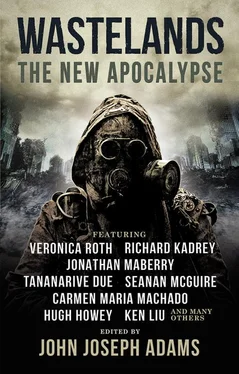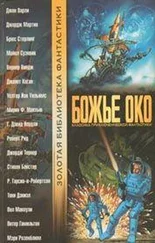When I arrive home, the flock gathers around me. I repeat words from our litany. Ancient words invested with new meaning. Gibberish of the gods, but now an expression of our bountiful future, of satiated appetite, of strength and mastery. I have found a new forest, and the meat of the gods will be our fruit.
Barefeather tucks her head, giving me permission to lead the flock into the next tomorrow.
“Let’s go to the mall,” I say.
Nisi Shawlis the author of the 2016 Nebula finalist novel Everfair and the 2008 Tiptree Award-winning collection Filter House . She is also the co-author of Writing the Other: A Practical Approach , a standard text on inclusive representation in the imaginative genres, and her short fiction has appeared in Strange Horizons, Asimov’s , the groundbreaking Dark Matter anthology series, and Best American Science Fiction and Fantasy . She has taught and spoken at institutions ranging from University of Hawai’i Manoa to Smith College, as well as in Sweden, Wales, and the Netherlands. Shawl is also a Carl Brandon Society founder and a Clarion West board member. She lives in Seattle.
“Let’s cross it while it’s still floating.” Aim was always in a hurry these days. Nearly eighteen, and she didn’t figure she had a whole lot of time left before she’d go Otherwise.
“Hold up,” I told her, and she listened. I listened, too, and I heard that weird noise again above the soft wind: an engine running. That was what cars sounded like; they used to fill the roads, back when I was only eleven. Some of the older models still worked—the ones built without chips.
A steady purr, like a big, fat cat—and there, I saw a glint moving far out on the bridge: sun on a hood or windshield. I raised my binoculars and confirmed it: a pickup truck, headed our way, east, coming towards us out of Seattle.
“What, Lo?” Aim asked.
If I could see them, maybe they could see us. “Come on. Bring the rolly; I’ll help.” We lifted our rolling suitcase together and I led us into the bushes crowding over the road’s edge. Leaves and thorns slashed at our pant legs and sleeves and faces—I beat them away and found a kind of clear area in their middle. Maybe there used to be something, a concrete pad for trash cans or something there. Moss, black and dry from the summer, crunched as we walked over it. We lowered the suitcase, heavy with Aim’s tools, and I was about to explain to her why we were hiding but by now that truck was loud and I could tell she heard it, too. All she said was, “What are they gonna think if they see our tracks disappear?”
I had a knife, and I kept it sharp. I pulled it out of the leather sheath I’d made. That was answer enough for Aim. She smiled—a nasty smile, but I loved it the way I loved everything about her: her smell; her long braids; her grimy, stubby nails.
I thought we’d lucked out when the truck barreled by fast—must have been going thirty miles an hour—but then it screeched to a stop. Two doors creaked open. Boot heels clopped on the asphalt. Getting louder. Pausing about even with where I’d ducked us off into the brush.
“Hey!” A dude. “You can come out—we ain’t gonna do ya no harm.”
Neither one of us moved a hair. Swearing, then thrashing noises, more swearing, louder as Truckdude crashed through the blackberries. He’ll never find us, I thought, and I was right. It was his partner who snuck up on our other side, silent as a tick.
“Got ’em, Claude,” he yelled, standing up from the weeds with a gun in his hand. He waved it at me and Aim and spoke in a normal tone. “You two can get up if you want. But do it slow.”
He raised his voice again. “Chicas. One of ’em’s kinda pretty but the other’s fat,” he told Claude. “You wanna arm wrestle?”
Claude stopped swearing but kept breaking branches and tearing his clothes as he whacked his way over to us. I stayed hunkered down so they’d underestimate me, and so my knife wouldn’t fall out from where I had it clamped between my thighs. I felt Aim’s arm tremble against mine as Claude emerged from the shadows. She’d be fine, though. Exactly like on a salvage run. I leaned against her a second to let her know that.
The dude with the gun looked a little older than us. Not much older, of course, or he’d have already gone Otherwise, found his own pocket universe, like nearly everyone else whose brain had reached “maturity”—at least that’s how the rumors went.
Claude looked my age, or a year or two younger: fourteen, fifteen. He and his partner had the same brown hair and squinty eyes; brothers, then. Probably.
I leered up at Guntoter. “You wanna watch me and her do it first?”
He spat on my upturned face. “Freak! You keep quiet till I tell you talk.” The spit tickled as it ran down my cheek.
I didn’t hate him. Didn’t have the time; I was too busy planning my next move.
“Hey, Dwight, what you think they got in here?” Claude had found our suitcase and given me a name for Guntoter.
“Open ’er up and find out, dickhead.”
I couldn’t turn around to see the rolly without looking away from Dwight, which didn’t seem like a good idea. I heard its zipper and the clink of steel on steel: chisels, hammers, wrenches, clamps, banging against each other as they spilled out on the ground.
“Whoa! Looky at these, Claude. You think that ugly one knows how to use this stuff?” Dwight took his eyes off us and lowered the gun like I’d been waiting for him to do. I launched myself at his legs, a two-hundred-twenty-pound dodgeball. Heard a crack as his left knee bent backwards. Then a loud shot from his gun—but only one before I had my knife at his throat.
“Eennngh!” he whined. Knee must have hurt, but my blade poking against the underside of his chin kept his mouth shut.
I nodded at Aim and she relieved him of his gun. Claude had run off—I heard him thrashing through the bushes in the direction of the road. “Be right back, Lo.” Aim was fine, as I’d predicted, thinking straight and acting cool. She stalked after her prey calm and careful, gun at the ready.
I rocked back on my haunches, easing off Dwight’s ribs a bit. That leg had to be fractured. Problema; how was I supposed to deal with him, wounded like this? Maybe I shouldn’t have hit him so hard. Not as if I could take him to a hospital. I felt him sucking in his breath, winding up for a scream, and sank my full weight on his chest again.
“Lo! You gotta come here!” Aim yelled from the road.
Come there? What? “Why? You can’t handle—You didn’t let him get his truck back, did—”
“Just come!” She sounded pissed.
Dwight wasn’t going anywhere on his own any time soon, but just in case I tugged off his belt and boots and pants and took away the rest of his weapons: a razor poking through a piece of wood, a folding knife with half the blade of mine, and a long leather bag filled with something heavier than sand. I only hurt him a little stripping off the pants.
I got to my feet and looked down a second, wondering if I should shoot the man and get his misery over with. Even after years of leading salvage runs I didn’t have it in me, though.
I loaded dude’s junk and Aim’s spilled-out tools in the rolly and dragged it along behind me into the bushes. When he saw I was leaving him he started hollering for help like it might come. That worried me. I hurried out to Aim. Had Claude somehow armed himself?
Claude was nowhere in sight. Aim stood by the truck—our truck, now. She had the door open, staring inside. The gun—our gun, now—hung loose in one hand and the other stretched inside. “Come on,” she said, not to me. “It’s okay.” She hauled her hand back with a kid attached: white with brown hair, like his brothers. They must have been his brothers—I got closer and saw he had that same squintiness going on.
Читать дальше


![Nick Cracknell - The Quiet Apocalypse [= Island Zero]](/books/28041/nick-cracknell-the-quiet-apocalypse-island-zero-thumb.webp)









